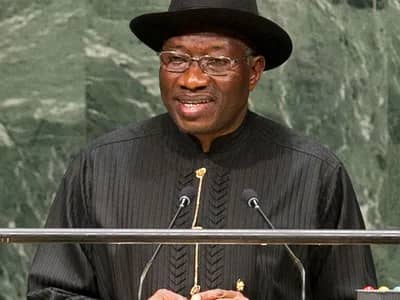The Shadow of Betrayal: Jonathan’s Reflection on the 2015 Election
Former President Goodluck Jonathan’s concession of defeat in the 2015 presidential election stands as a pivotal moment in Nigeria’s democratic history. His decision to peacefully transfer power to Muhammadu Buhari, despite the sting of electoral loss, was lauded as a statesmanlike gesture that averted potential post-election violence. However, beneath the surface of this gracious act lay a deep sense of disillusionment stemming from what Jonathan perceived as betrayals within his own political circle. Years later, these sentiments resurfaced during a celebratory event, offering a glimpse into the personal toll of political maneuvering and the complexities of loyalty in Nigeria’s political landscape.
The occasion was the 70th birthday celebration of Chief Mike Ogiadomhe, former Deputy Governor of Edo State and a close confidant of Jonathan. Amidst the festivities, Jonathan’s reflections on the 2015 election took center stage. He contrasted Ogiadomhe’s unwavering loyalty with the pervasive atmosphere of betrayal he experienced during the election period. Jonathan’s words painted a picture of a political environment rife with shifting allegiances and broken promises, where trust became a rare commodity. He highlighted Ogiadomhe’s steadfast support, describing him as someone who would “take a bullet” for him, a stark contrast to the many politicians he felt he could not rely on.
Jonathan’s lament underscores the delicate balance between personal relationships and political expediency in Nigeria’s political arena. The high stakes of political power often strain even the closest of alliances, leading to shifting allegiances and calculated betrayals. This dynamic is not unique to Nigeria, but the country’s history of political instability and the intense competition for resources can exacerbate these tendencies. Jonathan’s experience serves as a cautionary tale about the fragility of trust in the political realm and the personal costs associated with navigating this treacherous terrain.
The 2015 election was a watershed moment for Nigeria, marking the first time an incumbent president lost to an opposition candidate. The All Progressives Congress (APC), a relatively new party formed from a coalition of opposition groups, successfully capitalized on public dissatisfaction with Jonathan’s administration, particularly concerns about corruption and insecurity. While Buhari’s victory was celebrated by many as a sign of Nigeria’s democratic progress, Jonathan’s experience sheds light on the behind-the-scenes machinations and personal sacrifices that often accompany such transitions of power.
The birthday celebration for Ogiadomhe, attended by a prominent gathering of political figures, became an unexpected platform for Jonathan to air his grievances and reflect on the challenges of leadership. The presence of former governors, including Lucky Igbinedion, Osarhiemen Osunbor, Adams Oshiomhole, and Ibrahim Dakwambo, alongside other dignitaries, added weight to the occasion. The event showcased the enduring nature of political relationships, even amidst past rivalries and shifting alliances. The tributes to Ogiadomhe’s loyalty and dependability served as a counterpoint to Jonathan’s reflections on the betrayals he experienced, highlighting the complex interplay of trust and self-interest in the political sphere.
Oshiomhole’s remarks at the event further emphasized the importance of loyalty in the political landscape. He recounted his unwavering support for Jonathan, emphasizing his commitment to stand by him regardless of the political climate. This public declaration of loyalty, coming from a prominent political figure, underscored the significance of personal relationships in navigating the complexities of Nigerian politics. The event, intended as a celebration of Ogiadomhe’s life and career, inadvertently became a forum for reflecting on the broader themes of loyalty, betrayal, and the personal sacrifices inherent in the pursuit of political power. Jonathan’s candid remarks offered a rare glimpse into the emotional toll of political life and the enduring impact of the 2015 election on his personal and political trajectory.














